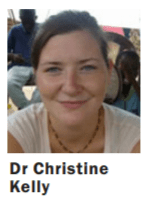Concerns over new Covid variants have reignited the argument over vaccine equity and access across the globe, writes David Lynch
The recent emergence of the Omicron variant of Covid-19 has made the calls for greater global vaccine equality even more intense from public health experts. They argue the lack of access to sufficient vaccines in many developing countries is both unfair and dangerous to the future direction of the pandemic. Recently, a number of Irish doctors founded Doctors for Vaccine Equity. The group’s aim is “to highlight the vast inequities in Covid-19 vaccine access worldwide”. Specifically, it supports the ‘TRIPS (Trade Related aspects of Intellectual Property Rights) waiver’ to allow vaccine production in the ‘Global South’.
The group also calls for an “urgent” global redistribution of current vaccine supplies and to ensure that “any
strategy for booster vaccines is ethical within a global context”. More than 300 doctors have signed an online petition supporting these measures (see https://globalhealth.ie/doctors-for-vaccine-equity/).
The group wants the Irish Government to support the TRIPS waiver. However, for months there have been calls for the Government to support the WHO Covid-19 Technology Access Pool (C-TAP) and the waiver. Is there any hope such action will be undertaken now?
“I am cautiously hopeful as I think the time may now be right for our Government to reflect on its policy towards Covid-19,” Prof Susan Smith, Professor of Primary Care Medicine and GP, Inchicore, Dublin, and one of the founder members of Doctors for Vaccine Equity, told the Medical Independent (MI).
“Understandably, we have been focused on protecting our own population and trying to minimise the impact of this virus in terms of serious illness and deaths but also on our wider society and economy. “I think we all hoped that the Covid-19 vaccines would represent a path out of the pandemic but it is clear that as long as the SARs-CoV-2 virus continues to circulate it can mutate and continues to threaten our health and wellbeing.”

She added that “a Professor of Virology has pointed out that if we were to design an experiment to increase viral mutation globally, our current unbalanced approach to vaccination would be it”. At the end of last month, the Department of Health and Department of Foreign Affairs (DFA) announced that a consignment of 500,000 Covid-19 vaccines donated by Ireland arrived in Nigeria.
It was the first part of Ireland’s commitment to donate 1.3 million vaccine doses through the COVAX (Covid-19 Vaccines Global Access) facility.
On the issue of the C-TAP, a spokesperson for the DFA told MI that while a number of EU countries had joined the in itiative, “there has not been consensus around this.” The spokesperson made no comment on Ireland joining. “Ireland will continue to promote the sharing of technology and has fully shared the intellectual property behind the Covid Tracker App to assist other countries in their contact tracing efforts.”

On the TRIPS waiver, the DFA spokesperson noted that “Ireland supports the EU commitment to an open dialogue with all WTO members to explore how to support universal and equitable access to Covid-19 vaccines and treatments…”.
Another founding member of the group, Dr Christine Kelly, SpR in Infectious Diseases and Clinical Fellow in Public Health Virology, told MI that “we believe that the most important path to an effective global vaccination campaign is through empowering economically disadvantaged countries to access vaccine production technology”.
“The protection of intellectual property rights and technology processes by a handful of pharmaceutical companies is blocking a successful global pandemic strategy. We urgently need to do everything we can to facilitate generic production of Covid-19 vaccines so that an adequate vaccine supply can be manufactured and so regions are able to adjust vaccines to respond to variants as they emerge”
She added that the TRIPS waiver is a motion put to the World Trade Organisation to temporarily waive intellectual property rights for health technologies needed to prevent, contain, or treat Covid-19. This waiver would remain in place “until widespread vaccination is in place globally, and the majority of the world’s population has developed immunity”
“The US supports the TRIPS waiver, but unfortunately the EU has not joined them. We strongly believe that Ireland must advocate for the support of the TRIPS waiver at EU level.”
Dr Ciara Conlan, Registrar in Medical Virology, added that the TRIPS waiver complements the WHO’s C-TAP.

“In February 2020, Access to Medicines Ireland made a submission on the C-TAP to the Joint Oireachtas Committee on Foreign Affairs and Defence,” she told MI.
“The committee were unanimous in their conclusion that Ireland should endorse the C-TAP; however, the Government did not follow through on this recommendation.
“We are now at a critical point as the WTO are due to meet shortly to discuss the TRIPS waiver. Ireland should advocate for support for the waiver at EU level, and add our name to the list of 120 countries who support the waiver, including the United States and our Irish Aid partner countries.”

But considering the small size of Ireland, does our stance matter significantly?
“We may be small, but the advantage of being within the EU is that we have a voice and we have used this well in
recent years,” Dr Kieran Harkin, GP and Access to Medicines Ireland co-founder, told MI.
“It just takes one firm voice to demand an ethical approach and, if done carefully, this would put great pressure on other countries to follow suit. Ireland has successfully taken a global lead in the past on issues, such as plastic bags, smokeless fuel, and banning of cigarette advertising etc. We also have an important international role through our seat on the security council [of the UN].”
There is an understandable push for booster vaccines. But should ‘first world’ governments, such as the Irish Government, take into account vaccine global inequality when making decisions on boosters?
“We understand that our patients and colleagues want the best protection they can get but we don’t think this is an ‘either-or’ situation,” said Prof Smith.
“We can support countries in the Global South to produce their own vaccines. One area where governments can address global vaccine supply is to avoid vaccine hoarding and wastage. There are estimates that up to 1.2 billion vaccine doses could be wasted in high income countries by the end of this year as they will not be used before they expire.
Countries need transparent systems of managing excess doses with adequate timelines to donate or give excess doses to COVAX, which can then redistribute them globally.”
Dr Harkin said that there “are hundreds” of pharmaceutical companies who are willing and able to manufacture
mRNA vaccine “but they are prevented doing so by the patent holder”.












Leave a Reply
You must be logged in to post a comment.